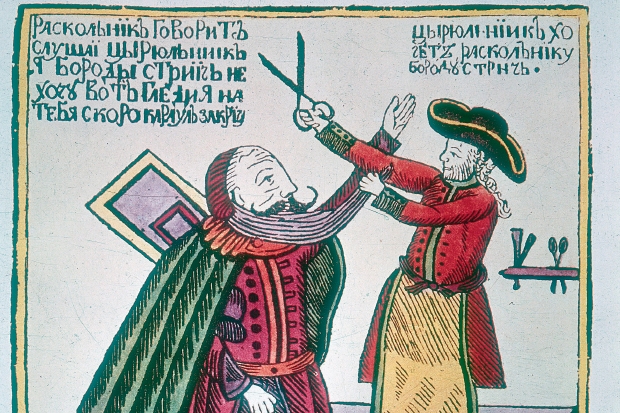The ocean that Christopher Oldstone-Moore has set out to chart is as broad as it is shallow: what it has meant to be bearded or shaven in the western world, from before Alexander the Great until the present day. Practicalities — shaving technology and the like — are mentioned from time to time, but only so that their importance can be minimised. His thing is the semiotics of beards.
And the range of signals that a beard could send out, over so many years, is bewildering. To be clean-shaven is to be a god, a priest, Louis XIV, a French conservative of the early 19th century or a 20th-century organisation man. To be bearded is to be a philosopher, a warrior, a Renaissance prince, an extreme French radical of the early 19th century or a respectable Victorian paterfamilias.
These signals can also be contradictory. To shave is to be a philosopher-king, like Alexander, who did away with his beard, Oldstone-Moore argues, in imitation of statues of the gods, to emphasise his uncanny youthfulness and power. To go bearded, by contrast, is to be a philosopher-king, like the emperor Hadrian, who wanted to show off his Stoic lack of vanity.
What beards never are, at least in Oldstone-Moore’s book, is ‘simply a matter of fashion’. He sees not short-term, trivial cycles of taste but ‘beard movements’ lasting decades or centuries, and telling us profound things about the nature of masculinity and authority. This makes more sense as a means of organising material and placing chapter divisions than it does as a way of telling a convincing story: even when the elements of a given ‘beard movement’ seem really to belong together, there’s not much of a chain of causation. And the style that comes with it is a sort of academic mock-epic, with the author in less than complete command of the joke:
As it turned out, of course, the revolution proceeded in fits and starts, proceeding from terror to war, Napoleonic glory and military defeat. The dreams of liberty, equality, fraternity and beardedness remained unfulfilled…
Oldstone-Moore can be brilliant when teasing out the meanings of specific beards. There’s a bravura passage on why Christ is clean-shaven in some early images and bearded in others (the smooth-chinned one is a god among men; the hairy one a man among angels), and another on the political meanings of facial hair in 1830s France. (It wasn’t just beards to the left and smooth faces to the right: liberals had moustaches; republicans added sideburns and, in more radical cases, a tuft of hair under the lower lip; a tuft and a moustache but no sideburns made you a Bonapartist.)
He has also collated a great deal of fascinating detail, on a timescale stretching from ancient Babylon to last year’s style magazines. Want an 1828 letter to the Times complaining about the cost of maintaining a military moustache? (It more or less had to be fake if it was to meet the strict regulations.) Or chapter and verse on the court case brought by a California teacher in 1963, after he was ordered to shave his beard on the grounds that it ‘might encourage Negro students to grow moustaches’? You can find it here.
Unfortunately, the awkwardness of some of the writing makes the anecdotes and analyses harder both to enjoy and to rely on. Can you trust a man who talks of W.G. Grace’s ‘ability to fight off any sort and speed of bowls’ to have been precise when he tells you that ‘a beard finally ceased to be an ex-communicable offence in the Catholic church’ in 1917? (Having Googled, that appears to be at least mostly true: it could be excommunicable for priests, in extreme circumstances, although the rule was against ‘cultivating’ a beard, and sometimes interpreted to permit short, unshowy ones. Of Beards and Men itself contains an illustration of a bearded pope.)
But even if that puts you off buying the book, it’s worth seeking out in a shop, for the sake of a glance at Oldstone-Moore’s author photos. There are two, one with beard and one without. He looks better as a god than as a philosopher.






Comments